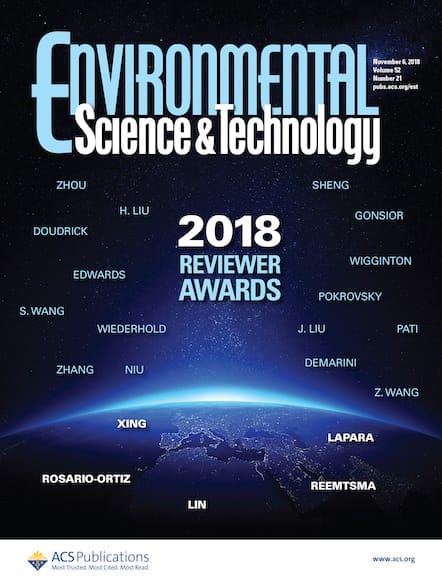King Abdullah University of Science and Technology (KAUST) Professor Peiying Hong is the recipient of the 2019 James J. Morgan Environmental Science & Technology Early Career Award.

King Abdullah University of Science and Technology (KAUST) Professor Peiying Hong is the recipient of the 2019 James J. Morgan Environmental Science & Technology Early Career Award. The James J. Morgan ES&T Early Career Award, named after the first Editor-in-Chief of Environmental Science & Technology, recognizes the contributions of early career researchers who have led the field in new directions through creative, new ideas consistent with Morgan’s early contributions in environmental chemistry.
Professor Hong is an Associate Professor in the Division of Biological and Environmental Science and Engineering at King Abdullah University of Science and Technology (KAUST). She received her Ph.D. in environmental science and engineering from the National University of Singapore in 2009. She took a postdoctoral fellowship at Department of Animal Science in University of Illinois at Urbana Champaign before joining KAUST in 2012 as an Assistant Professor. She was recently promoted to Associate Professor in July 2018. Professor Hong’s research in the field of environmental microbiology is characterized by her utilization and mastery of multidisciplinary technologies, spanning molecular biology, genomics, process engineering, and applied microbiology.
In 2019, the James J. Morgan ES&T Early Career Award will be presented at the ACS Spring 2019 National Meeting & Exposition in Orlando, Florida, where Professor Hong will give an invited talk. Recently, I had a chance to conduct a short interview with Professor Hong to learn more about her work.
What prompted you to study the field of Environmental Science and Engineering?
I am from Singapore, a country with no natural water resources but through innovations and research in water technologies, managed to achieve water sufficiency. I was and still am inspired by how this field can truly impact society. Back when I was still a teenager, I was acutely aware and concerned about the various environmental problems that need to be resolved – climate change, wastewater treatment, anthropogenic pollution, just to name a few. These are all motivations that prompted me to study the field of Environmental Science and Engineering in National University of Singapore. During my undergraduate studies, I was exposed to many different aspects of the field and was particularly fascinated by applied environmental microbiology as I see these microorganisms as both superheroes and supervillains depending on which microorganism we are talking about and the ecosystem they exist in.
What are the major challenges still facing this field?
Global issues like water scarcities and climate change remain to be major challenges that are not easy to resolve. Because of the magnitude of these challenges, I believe only multifaceted, cross-disciplinary solutions can truly address these challenges in an impactful way. We might be making better progress in addressing water scarcities simply because many countries have now recognized that new technologies exist in expanding our water resources and enable them to close the water cycle loop. These success stories in certain countries create an optimism we could rely upon when addressing other major challenges facing this field. As long as we have the political will, technologies, and an open mindset, we can slowly but surely work towards addressing these challenges.
What advice would you give to upcoming researchers in the field?
I believe it is important for us as researchers to first visualize the problem and needs, devise systematic approaches to understand the fundamental aspects of the problem and then demonstrate the appropriate applied solutions. It is important to keep an open mind when listening to seminars or presentations seemingly non-related to your field because you never know when an eureka moment would strike. I particularly enjoy those times when I get inspired by researchers working in other fields and when I was able to successfully integrate those ideas to my existing research.
What does it mean to you to be awarded the 2019 James J. Morgan ES&T Early Career Award?
I am very honored to be awarded the 2019 James J. Morgan ES&T Early Career Award. Receiving this award allows me to express my gratitude to all the giants who allowed me to stand on their shoulders. They allowed me to reach high and move in big strides. These giants include KAUST who believed in me and my research directions, the mentors I met throughout my career who so graciously shared with me advice and guidance, and my team members who shared the same vision and passion as me.
